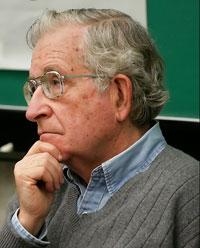The Thought of Noam Chomsky

Noam Chomsky is a fascinating character. The foremost critic of American foreign policy, he has been described as the world's 'leading public intellectual' and has been in the public eye since his anti-Vietnam war campaigning in the 1960s. My opinions on Chomsky's ideas have changed over time, but unlike many of his critics, I believe his work has progressive value, despite significant misgivings.
The first time I properly engaged with Chomsky was after purchasing 'Deterring Democracy' from a bookshop in London Victoria. Whilst it was dispassionate in one sense, with its extensive use of sources, it was highly emotive in another, and deeply uncomfortable to read.
Chomsky's work has been important in highlighting the sometimes murkier reality behind America's idealism, and in exposing double standards in respect of the regimes the USA has strategically supported. In my view, his work points to a certain superpower recklessness, and it should serve to remind America of its responsibilities as the most powerful country on earth.
Yet in other respects, I cannot agree with Chomsky's logic.
Everything he pens is viewed through two major themes, power and the pursuit of profit. This simple Marxian reductionism is surely incapable of explaining the inevitably complex nature of events and the range of human motives that accompany the logic of decision-making. Was it really the case, for example, that the Cold War was simply a pretext for America's global capitalist ambitions and had nothing to do with two very different forms of government and attitudes towards individual freedom? He doesn't seem to entertain the possibility. Whilst Chomsky never has been a 'Marxist-Leninist' or orthodox Communist, he doesn't give due analysis to Soviet expansionism, which re-enforces his bias against American foreign policy.
Although his writings are supposedly based on intellectual honesty, he skims over uncomfortable realities so that they do not obstruct the logic of his argument. David Horowitz has written an excellent article which touches upon the American invasion of the small Caribbean island of Grenada in 1983, an action which Chomsky was highly critical of.(http://www.frontpagemag.com/Articles/ReadArticle.asp?ID=1018 )
Yet Grenada, at the time of the American invasion, was not undergoing a 'mild social revolution', as Chomsky claims, but had actually just gone from being run by a Castro protege to an even more hardline Communist. Neither was this claim American propaganda. In a chat with the International Socialist Review, when Grenanda is discussed, Chomsky makes his predictable arguments, whilst failing to acknowledge the fact that at least four east caribbean heads of government had requested the help of the Reagan administration in deposing the Grenadan Communists. ( http://www.chomsky.info/interviews/200408--.htm) The Caribbean leaders had genuine worries about a Pro-Cuban base in the region, but did not have the military resources themselves to remove the Marxist dictatorship.
If we are to consider the broader picture, American imperialism and aggression are not quite what Chomsky makes them out to be. It is right to ask difficult questions, such as why the United States did support certain dubious states at various times during the Cold War, but if our arguments aren't consistent with the fullest scale of facts, our search for truth and justice becomes mired in a personal agenda, which would obscure our better judgements.


2 Comments:
"...if our arguments aren't consistent with the fullest scale of facts, our search for truth and justice becomes mired in a personal agenda..."
Of course - and thus I think it is important to take popular narrators such as Chomsky with a big pinch of salt. Outside of the academy, one can print anything, which rather gives the semblance of verity; of course, it doesn't. Chomsky is engaging as much with his subject as much as his personal agenda just as Horowitz is. If you want to know what "actually happened", I would suggest disregarding them both!
For Politics to remain interesting, I think the practice of passing mild judgement is important. My argument wasn't that Horowitz has all the correct answers, merely that Chomksy might omit important facts that if admitted would erode the logic of his analysis.
Post a Comment
<< Home